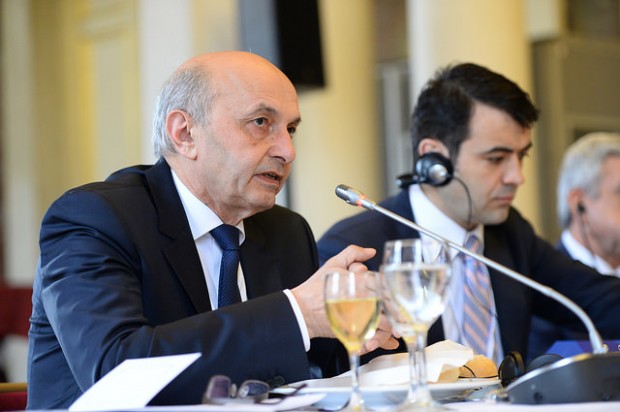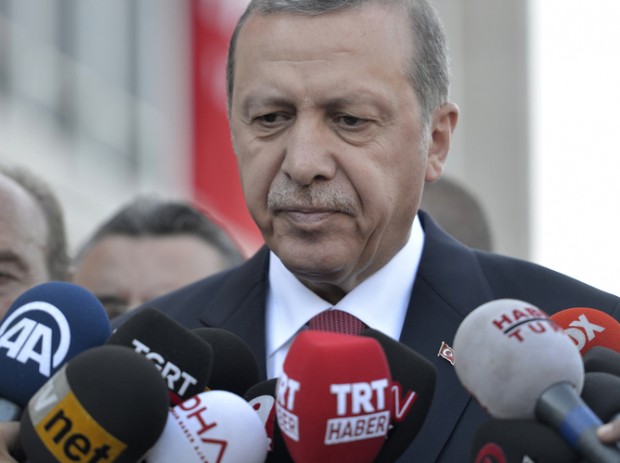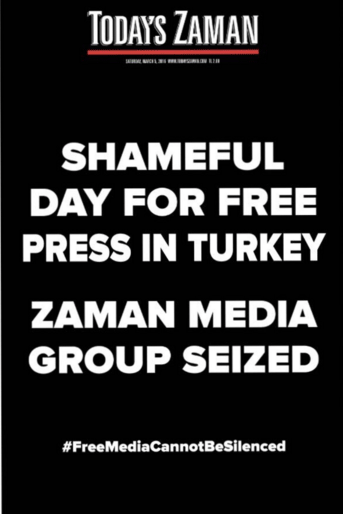3 May 2016 | Mapping Media Freedom, mobile, News and features, Turkey, Turkey Uncensored

February 4, 2013. Recep Tayyip Erdogan during a press conference in Prague.
With conditions worsening on a daily basis, Turkey now risks total blackout on public debate.
Punitive measures and harsh restrictions have diminished the domain for free and independent journalism, and media pluralism is showing strong signs of total collapse.
As Index on Censorship’s Mapping Media Freedom project highlights in its latest quarterly report, the country experienced a large number of media freedom violations.
“Over half of the arrests [in the first quarter of 2016] occurred in Turkey when journalists were reporting on violence or protests in the country,” the report said. “The data indicates a pattern where arrests are launched on terror charges or taking place during anti-terror operations.”
In its latest World Press Freedom Index, scrutinising media in 180 countries, Reporters Without Borders (RSF) ranked Turkey as #151, marking yet another fall, this time by two positions.
“President Recep Tayyip Erdogan has embarked on an offensive against Turkey’s media. Journalists are harassed, many have been accused of ‘insulting the president’ and the internet is systematically censored,” RSF said in its findings.
The decline was even more dramatic in the annual Freedom of the Press 2016 survey by Freedom House. Its survey over the past year marked a fall by six points, placing Turkey as 156th among 199 countries, again among those as “not free”.
“The government, controlled by Erdoğan’s Justice and Development Party (AKP), aggressively used the penal code, criminal defamation legislation, and the country’s antiterrorism law to punish critical reporting, and journalists faced growing violence, harassment, and intimidation from both state and non-state actors during the year. The authorities continued to use financial and administrative leverage over media owners to influence coverage and silence dissent,” it concluded.
This downfall is unprecedented in intensity. The country’s remnant core of brave, free and independent journalists, regardless of their political views, now agree that free journalism will soon cease to exist in Turkey. With full-frontal attacks on the media, the sector may become subservient to the political and bureaucratic power, with content rife with stenography and propaganda.
Legal inquiries and charges against journalists are continually on the rise. According to the ministry of justice, the number of “insulting the president” cases passed 1,800 since mid-2014.
In other cases, such as the charges brought against Cumhuriyet daily, its editors Can Dündar and Erdem Gül are accused of spying and treason, for printing news stories about lorries carrying weapons, allegedly to Syrian jihadist groups, by the government’s orders.
In another notorious case, investigative journalist Mehmet Baransu has been detained for over 13 months over his inquiries into the alleged abuses of power within the military.
In a fresh case, two senior journalists from Cumhuriyet, Ceyda Karan and Hikmet Çetinkaya, were sentenced to two years each in prison for “inciting hatred”. Their “crime” was to reprint the Charlie Hebdo front page cartoon in their column, which they said was an act of professional solidarity.
According to Bianet, a monitoring site, there are now 28 journalists in Turkish prisons, many of whom are affiliated with the Kurdish media, based on charges brought under anti-terror laws.
The draconian nature of charges and prison sentences leave little doubt about AKP government’s intent to criminalise journalism as a whole.
Punitive measures against journalism go far beyond court cases. The most efficient method has proven to be firing journalists who insist on exercising basic standards of the profession.
Since mid-2013, following Gezi Park protests, 3,500 journalists have lost their jobs. Media moguls have come under increasing pressure from the government, which demands action or threatens to cancel lucrative public contracts. Taking advantage of the low influence of trade unions (fewer than 4% of journalists are members), employers axe staff arbitrarily.
As a result of this widespread exercise in conglomerate-dominated “mainstream media”, with newsrooms turned into “open-air prisons”, self-censorship in Turkey has become a deeply rooted culture. Blacklists have been drawn up of TV pundits and columnists in the press, who are known for critical stands, no matter their political leaning.
What apparently weighed heavy in the gloomy figures by Index on Censorship, RSF and FH is the fact that, from early last year, authorities started also targeting large, private media institutions, known for critical journalism.
Hürriyet, an influential newspaper belonging to Doğan Media was attacked by a mob two nights in a row last summer, after which its owners felt they had to “tone down” critical content.
In even more dramatic cases, Koza-Ipek Media outlets were raided by the police last autumn, followed some months later by a similar large-scale operation against Zaman Media, second largest group in the sector, and the largest independent news agency, CHA.
These seizures, along with some other critical channels yanked off satellite and digital platforms in recent months, left a huge vacuum, threatening to terminate the diversity of the media.
Now, with around 90% of the sector under direct or indirect editorial control of the AKP government, including the state broadcaster TRT, there are only three critical TV channels and no more than five small-scale independent newspapers left.
As a result of these assaults, two things are apparent: firstly, investigative journalism is blocked and news is severely filtered; secondly, with diversity fading out, public debate, a key aspect of any democracy, is severely limited.
Along with routine bans on reporting on specific events such as terror attacks, severe accreditation restrictions and a newly emerging pattern of deporting international media correspondents, the conclusion is inevitable.
A profession faces extinction and along with its exit, and a thick wall between the truth and the public, both domestic and international, is emerging. This total collapse will have far deeper consequences than anyone can imagine.

Turkey Uncensored is an Index on Censorship project to publish a series of articles from censored Turkish writers, artists and translators.
4 Apr 2016 | Azerbaijan, Azerbaijan News, Latvia, Mapping Media Freedom, mobile, Netherlands, News and features, Poland, Russia

(Photo illustration: Shutterstock)
Each week, Index on Censorship’s Mapping Media Freedom project verifies threats, violations and limitations faced by the media throughout the European Union and neighbouring countries. Here are reports from between 25 March and 1 April that give us cause for concern.
Russian journalist found dead in St Petersburg
A prominent journalist, Dmitry Tsilikin, was found stabbed to death in his apartment in St Petersburg on 31 March. Tsilikin was a well-known art critic and worked for outlets such as Vogue and Elle.
The last time Tsilikin contacted his friends or relatives was on 25 March when he came back from an assignment in Riga. When relatives found his body, his mobile phone and computer were missing. Police have opened a criminal case and an investigation.
Netherlands: Journalist imprisoned by war crimes tribunal
French journalist and former employee of the International Criminal Tribunal for the Former Yugoslavia Florence Hartmann was held in solitary confinement at the UN Detention Unit from 24-29 March. The journalist was waiting to hear the verdict at the trial of war criminal general Radovan Karadzic when she was detained by UN police outside The Hague.
Hartmann was held under suicide watch conditions, with her cell lights on 24 hours a day. She reported being able to watch Ratko Mladic – the accused Bosnian Serb military leader – exercising in the prison yard from her cell window.
Azerbaijan: Writer banned from leaving the country and accused of hooliganism
Azerbaijani writer Akram Aylisli was banned from leaving the country and detained at the airport outside Baku on 30 March. Orkhan Mansurzadeh, a representative for the Ministry of Internal Affairs, claimed Aylisli caused a scuffle at the airport while going through customs. Aylisli, who was on his way to Venice for a book festival, was then informed that he was subject to a travel ban.
After spending 12 hours in police custody he was accused of hooliganism.
In a statement to Index on Censorship, he said: “Absurdly and illogically, this alleged incident of punching a border guard happened well after the plane departed and was later used by the border service as an explanation for denying the border crossing before the plane had left!”
Poland: 117 journalists lose jobs at public broadcasters
Since December 2015, 117 public sector journalists have lost their jobs in Poland. Eighty journalists were dismissed, had their contracts invalidated or were forced to transfer onto less significant post in different programmes or departments. Many others resigned or left “in mutual agreement”.
Positions were affected across multiple programmes on national channels TVP1, TVP2, TVP Info, TVP Kultura, and Polskie Radio; 15 journalists have left the TV channel’s major news show Wiadomosci.
On 30 December 2015, newly implemented legislation gave a government minister exclusive powers to appoint and dismiss all members of the supervisory and management Boards of TVP and PR.
Latvia: Russia-based website taken down by government agency
The Latvian language website for the Russia-based Sputniknews.lv was taken down by Latvia’s national internet domain registry, the Network Information Center on 29 March. The NIC, which controls .lv domains, cited EU sanctions against Dmitry Kiselyov, the head of Sputnik’s parent company, Rossiya Segodnya, as to why the site was taken down.
An article on sputniknews.com highlights that “Latvia is the latest among Baltic nations to ban the work of or deport journalists based in Russia”.
24 Mar 2016 | About Index, Europe and Central Asia, Mapping Media Freedom, News and features

Each week, Index on Censorship’s Mapping Media Freedom project verifies threats, violations and limitations faced by the media throughout the European Union and neighbouring countries. Here are just five reports from 15-22 March that give us cause for concern.
Serbia: B92 journalists receive several death threats
Several death threats have been sent to journalists at the investigative journalism portal insajder.net which is owned by broadcaster B92. The threats were sent via email to several reporters between 14 and 22 March.
Insajder’s editor-in-chief Brankica Stankovic and B92’s editor-in-chief Veran Matic have also received threats. Both have been under police protection for years due to severe threats.
Interior Minister Nebojsa Stefanovic announced on 23 March that a person had been arrested for threatening Stankovic and Matic. Due to a pending police investigation no details of the threats have been revealed, Veran Matic told Index on Censorship.
Kosovo: Investigative journalist claims prime minister threatened him

Isa Mustafa, European People’s Party Summit, March 2015, Brussels. Credit: Flickr / EPP
Vehbi Kajtaz, a journalist for the investigative reporting portal insajderi.com claims he received a threatening phone call from Kosovo’s prime minister, Isa Mustafa, on 20 March.
Kajtazi had published an in which he criticised Kosovo’s healthcare system, stating it is so poor that even Mustafa’s brother has to seek asylum in the EU for treatment for his throat cancer. Mustafa has denied threatening the journalist.
On 21 March, Kajtaz wrote on his Facebook page that Mustafa had called him on his mobile phone on the day previous. Kajtazi claims that Mustafa was angry about an article mentioning his brother and said that the journalist would “pay heavily”.
Serbia: Investigative portal claims to be monitored by pro-government tabloid
The Serbian Crime and Corruption Reporting Network (KRIK) has condemned the “lynch campaign” against it by Informer, a Serbian pro-government tabloid. KRIK claims Informer has been following its editor-in-chief Stevan Dojcinovic, monitoring its work and putting his life at risk.
On 18 March, Informer published a photo of Dojcinovic on the front page with an article stating that KRIK is working with “drug dealers, criminals, corrupt cops, but also agents of some of the foreign intelligence services” in order to force prime minister Aleksandar Vucic to give up his position.
“Besides the fact that KRIK’s editor was followed and photographed on the street, we are most concerned about the details presented in the article about specifics of our current journalistic research on the assets of politicians,” Jelena Vasic from KRIK told Index on Censorship. “This raises a serious question about who is monitoring KRIK and how they know the details of our unpublished stories.”
Russia: Local editor and deputy knifed by two assailants
Two unidentified individuals attacked Igor Rudnikov, the founder and editor of the newspaper Novaye kolyosa and deputy of the Kaliningrad district parliament, on 17 March. The attack took place at a café in the city centre where Rudnikov often frequents.
The assailants reportedly waited for him outside the café and when the editor left, they slashed him with a knife. Rudnikov was taken to hospital where he was operated on. The editor’s contacts claim the attack is related to his journalism activities.
He has published a number of articles on crime and corruption in the Kaliningrad region. He was previously assaulted in 1998 when he was Rudnikov was severely beaten in the entrance to his home.
Macedonia: Constitutional court ban journalists from session
The constitutional court in Macedonia announced on 16 March that a session on whether the president will regain the right to pardon persons convicted of electoral fraud would be closed to journalists and the public.
A heavy police presence kept protesters and critics 100 metres away from the court building, while a group of government supporters had set up camp protesting “in defence of the judges”. In a statement, the Association of Journalists in Macedoni (ZNM) and condemned the decision to hold such an important session behind closed doors and have.
Until 2009, the president had right to pardon people accused of convicted of electoral fraud. The court has now ruled that the president can pardon alleged election-riggers.
23 Mar 2016 | Mapping Media Freedom, mobile, Turkey

The increasingly autocratic government of Recep Tayyip Erdogan, president of Turkey, has clamped down on press freedom and opposing political viewpoints. Index on Censorship has condemned the ongoing attack on freedom of expression and, through its project Mapping Media Freedom, monitored the growing threats to the media. Below is a roundup of our recent reporting on media violations in Turkey.
Below is a roundup of our recent reporting on the ongoing media freedom crisis in Turkey.
Writers and artists condemn seizure of Zaman news group
Index joined with writers, journalists and artists around the world to condemn the seizure of Turkish independent media group, Zaman. Read the full letter
Letter: EU must not ignore collapse of media freedom in Turkey
Press freedom and media organisations wrote to Donald Tusk, president of the European Council ahead of the meeting between EU leaders and Ahmet Davutoğlu, prime minister of Turkey, to express their concern over the collapse of media freedom in Turkey. Read the full letter
Petition: End Turkey’s crackdown on press freedom
Join Index on Censorship, writers, journalists and artists from around the world to condemn the shocking seizure of Turkish independent media group, Zaman. Sign the petition
Turkish court orders seizure of Zaman news group
The seizure of Turkey’s biggest opposition newspaper is the latest move against press freedom in the country. Since the election of Turkey’s president Recep Tayyip Erdoğan in 2014, the increasingly autocratic politician has waged an ongoing war with voices critical of his government. Read the full article
Kaya Genç: On “coup plots”, journalism trials and Turkey’s need for a proper dissensus
The modern crisis in Turkey’s journalistic freedoms began in 2008. Index on Censorship magazine’s Kaya Genc revisits the “coup cases” that ended up turning Turkish journalism into a field of feuds and hostilities. Read the full article
Zaman: The murder of a newspaper
On Friday night, security forces stormed Zaman, the widest-circulating Turkish newspaper. Though many Turkish news outlets studiously avoided covering the raids, the screens of international news channels were full of images of Turkish police using tear gas and water cannon against protestors trying to protect their paper. Particularly striking were the injuries to young women wearing Islamic headgear, the very segment of the community, which the ruling Justice and Development Party (AKP) once vowed to defend. Read the full article
Turkey: A long line of press freedom violations
Turkey’s government and courts have demonstrated their unwillingness to adhere to basic values on press freedom and media pluralism. From judicial harassment and seizing media companies to silencing Kurdish and critical media, Turkey’s government has been used by President Recep Tayyip Erdogan to silence critical voices in the country. Read the full article
Turkey: War on journalists rages on
The ongoing deterioration in Turkey’s press freedom has been well documented by Index on Censorship’s Mapping Media Freedom project since its launch in 2014. Read the full article
 Zaman’s censored writers
Zaman’s censored writers
The following columns were submitted to and rejected by the new management of the seized Zaman and Today’s Zaman.
Yavuz Baydar: Bid farewell to journalism, and lose Turkey
Following the presidential attacks on Turkey’s top judicial body, the Constitutional Court, stemming from its pro-freedom ruling over the case of Can Dündar and Erdem Gül of Cumhuriyet, and the unplugging two opposition channels from Türksat satellite, the dramatic seizure of Zaman and this newspaper, Today’s Zaman, both highly influential in their own ways, is one of the final nails in the coffin of journalism in Turkey. Read the full column
Nicole Pope: A lack of free media allows Turkish authorities to control the narrative
How do you write a column for a newspaper that still exists nominally but has been taken over by trustees appointed by an “independent” court? Such are the dilemmas in a country where democratic standards are slipping rapidly. No journalism school or manual of ethical journalism prepares one for such a situation. Read the full column
İhsan Yılmaz: No more genuine elections in Turkey
Just before I wrote my last piece for Today’s Zaman, there were rumors that the Zaman daily, written in Turkish, and Today’s Zaman, would be seized by the government. Read the full column
Suat Kınıklıoğlu: Europa Europa
Turks who are putting up a brave fight confronting the authoritarianism in this country every day are simply aghast at the show put on in Brussels. Turkey’s democrats have been thoroughly exposed to the crude pragmatism of the EU. Read the full column
Yaşar Yakış: Turkey’s bargain with the EU
An important step has been taken in Turkey’s painful negotiations with the EU. Turkey submitted to the Turkey-EU summit, held in Brussels on 7 March, several proposals. Read the full column
Doğu Ergil: Turkey, the humanitarian crisis and erratic responses
The numerical figures of the reality of Syrian refugees in Turkey are as follows: 2.2 million of the 4.3 million displaced Syrians who have been registered as persons of concern by the Office of the United Nations High Commissioner for Refugees (UNHCR) currently reside in Turkey. There is an estimated 400,000 who have settled in various parts of Turkey relying on their own financial resources. The total number of Syrian refugees in Turkey is higher than the entire population of six of the EU’s 28 member states. Read the full column







 Zaman’s censored writers
Zaman’s censored writers